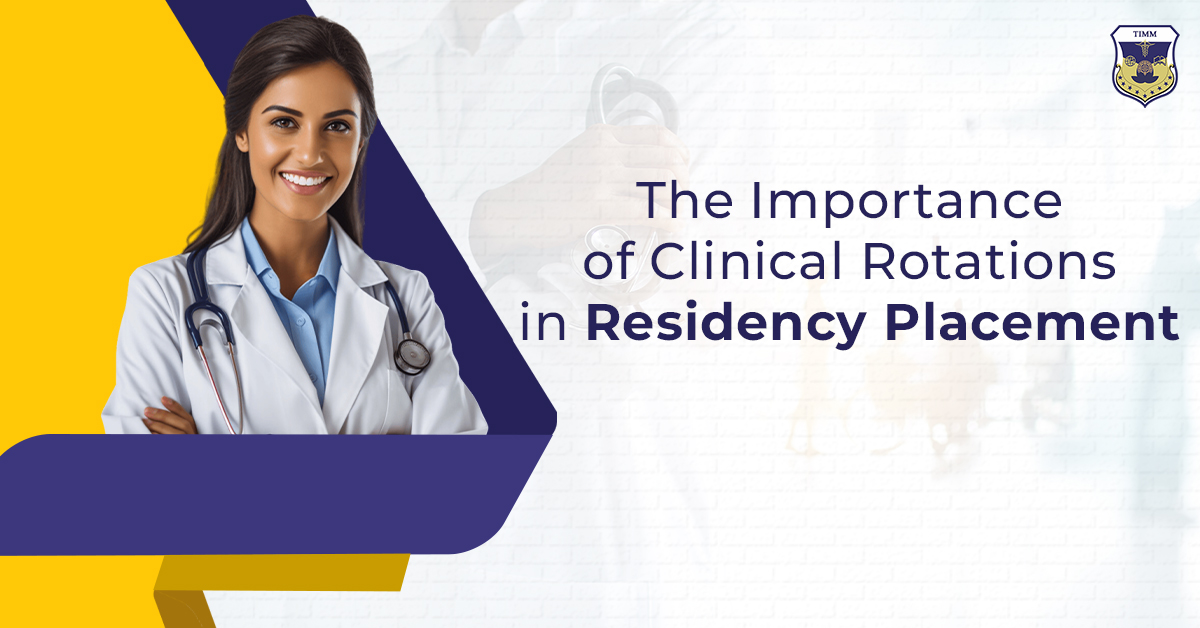|
|
Blog Summary
Introduction
The journey to becoming a medical doctor is rigorous and challenging, and it reaches a critical juncture: securing a residency placement. In this pivotal transition, the significance of clinical rotations in medical education cannot be overstated. These clinical experiences provide aspiring physicians with invaluable real-world exposure that textbooks and lectures cannot replicate. In this article, we will explore the multifaceted importance of clinical rotations in shaping the future of medical professionals.
Building Practical Skills: Hands-On Learning
Clinical rotations are the crucible in which medical students transform theoretical knowledge into practical skills. While lectures and textbooks are essential for building a foundational understanding of medicine, they are only the beginning. The true essence of medicine lies in applying this knowledge in the field.
During clinical rotations, students step into the hospital or clinic setting, don their white coats, and immerse themselves in the world of patient care. They work alongside experienced physicians, nurses, and healthcare teams, gaining hands-on experience that includes diagnosing patients, formulating treatment plans, and executing procedures. This immersive learning experience is the bedrock of clinical competence.
Translating classroom knowledge into actual patient care is a skill that cannot be underestimated. Clinical rotations foster a deeper understanding of the complexities of medicine, enabling students to develop clinical judgment and problem-solving abilities vital for competent medical practice.
Exposure to Different Specialties: Shaping Career Decisions
One of the unique advantages of clinical rotations is the exposure they provide to various medical specialities. Medicine is a vast and multifaceted field with numerous subspecialties, each offering its own challenges and rewards. Clinical rotations allow students to explore these different facets of medicine and gain insight into their interests and passions.
For example, a student who initially considered pursuing surgery might find that they are more drawn to the intricacies of internal medicine or paediatrics after a clinical rotation in those specialities. These experiences are instrumental in helping students make informed decisions about their future careers.
Moreover, exposure to diverse medical specialities can broaden a student’s perspective and foster a more comprehensive approach to patient care. Understanding the intricacies of various things allows future physicians to collaborate effectively in multidisciplinary healthcare teams, providing patients with comprehensive and well-rounded care.
Networking Opportunities: Connecting with Mentors
During clinical rotations, students have the unique opportunity to form professional relationships with attending physicians and mentors. These connections can be invaluable not only for learning but also for future career prospects. Mentors can provide guidance, share their experiences, and offer valuable insights into the medical field.
Additionally, these relationships can lead to solid letters of recommendation when students apply for residency programs. Program directors often rely on the input of experienced physicians who have observed a student’s performance during clinical rotations. A well-placed word from a mentor who has witnessed a student’s dedication and aptitude can make a significant difference in the highly competitive residency application process.
Residency Placement: The Link to Clinical Rotations
The ultimate goal of every medical student is to secure a residency placement in their chosen speciality. Clinical rotations are pivotal in determining a student’s readiness for residency. Program directors seek candidates who possess the requisite knowledge and demonstrate clinical competence, professionalism, and a commitment to patient care.
Clinical performance during rotations is a crucial metric for evaluating a student’s suitability for residency programs. Program directors are looking for candidates who can hit the ground running, providing safe and effective patient care from day one of their residency. Students who have excelled during their clinical rotations are more likely to be viewed favorably by residency program selection committees.
Furthermore, the experiences and skills acquired during clinical rotations prepare students for the challenges they will face in residency. The confidence, adaptability, and clinical understanding developed during processes are indispensable assets as they transition into the demanding residency training environment.
Tips for Maximizing Your Clinical Rotation Experience
Stay Engaged:
- Actively participate in patient care.
- Ask questions.
- Seek opportunities to practice your skills.
Be Professional: Maintain a high level of professionalism, including punctuality, communication, and respect for patients and colleagues.
Build Relationships: Form connections with attending physicians and mentors. These relationships can be beneficial for both learning and future career development.
Stay Open-Minded: Approach each rotation with an open mind and a willingness to learn. You never know where your true passion in medicine may lie.
Conclusion
In the journey of a medical student, clinical rotations serve as a vital steppingstone towards becoming a competent and compassionate physician. These experiences build practical skills, shape career decisions, provide networking opportunities, and significantly impact residency placement. As future doctors, the lessons learned during clinical rotations will continue to resonate throughout their careers, guiding them toward excellence in patient care and medical practice. The importance of clinical rotations cannot be overstated; they are the bridge that connects the classroom to the clinic and paves the way for a successful career in medicine.


